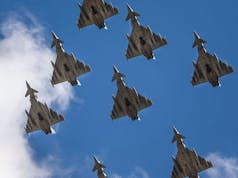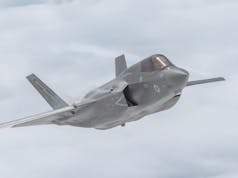BAE Systems has been awarded a £3m contract to provide technology for Kongsberg’s Joint Strike Missile system for the F-35.
The firm says that the new contract will see BAE Systems provide expertise of radar absorbing material and sensor development and technology integration to the highly capable Joint Strike Missile system which is currently being adopted by Norway and Japan.
Kongsberg’s Joint Strike Missile is the only long range sea and land target missile that can be carried internally in the F-35 aircraft.
Bob Davidson, General Manager of BAE Systems Advanced Technology Solutions, said:
“BAE Systems has a long term relationship with Kongsberg Defence & Aerospace over the last 15 years supporting its signature control requirements on the Naval Strike Missile and Joint Strike Missile programmes. This contract award builds on our collaboration and our commitment to provide high standard products and services and we are pleased to provide critical advantage to Kongsberg’s customers around the globe. It also shows our ongoing investment in our Towcester facility where the work will be delivered, sustaining highly skilled jobs in Engineering, Project Management and more for at least the next year, with the potential to expand further as sales of the Joint Strike Missile increase.”
Øyvind Kolset, EVP Missiles, Kongsberg Defence and Aerospace said:
“BAE Systems is an important partner for KDA and provides vital technology in our missiles. I would like to highlight the good cooperation and professionalism BAE Systems has shown through our long term relationship.”
Kongsberg has also recently placed an order with BAE Systems in Australia to acquire an additional 180 Passive Radio Frequency Sensors (PRS) providing additional capability for its Joint Strike Missile. This completes the first full rate of production order for 200 PRS sensors and is the result of successful and efficient operations between the two companies over the past five years, say the firm.












Hopefully our F-35’s can carry this. Would fit into and A and C variants weapons bay but a ‘b’ would be forced to carry this is externally, compromising stealth. Not that i would need stealth for ant-ship operations anyway.
“”Kongsberg’s Joint Strike Missile is the only long range sea and land target missile that can be carried internally in the F-35 aircraft.””
Actually. there is another, the Turkish ‘SOM’ cruise missile (variant J) which was designed alongside Lockheed to fit inside the F35,
https://www.youtube.com/watch?v=Y6wFsEJ4mlM
How will that work now that Turkey has had its orders cancelled?
Borris wrote:
Not sure but seeing as how the Turks have sold their Bayraktar UAV (and Mam missiles) to Poland and has possible sales to:
Hungary
Bulgaria
Latvia
I can’t see the sales of the SOM J being a problem. Also whilst the SOM J was designed for internal carriage by the F35, the Turks have ok’d the other 5 variants for use on their F16 and F4
Might it be so that the weapons can be carried stealthily, externally?
Might we see an order for the UK for that reason?
£3m is small change in defence terms
It is not the only internal missile , the Turkish missile is approved for that too .. but they are currently not part of the program anymore
The original spec of the NSM was for a stealthy subsonic missile. Kongsberg have not said if the missile is built using a composite or metal skin. But it has been shaped to have a reduced RCS. If BAe give them the embedded radar absorbent material (RAM) composite skin. This missile will be even more deadlier, as it will mean that it can get significantly closer to the target before its likely to be detected.
Both BAe and Kongsberg have both been tied together in recent news publications, for example the inclusion of the BAe RF detector for both the NSM and JSM. Is it too much of a coincidence, or will be hearing of a MoD statement soon about the winner of the I-SSM?
Surely this has to be the or one of two frontrunners for I-SSM?
It ticks a lot of boxes and would greatly enhance our F35 strike capabilities.
Those are my thoughts to!
At the moment only the NSM/JSM ticks the UK’s current RoE. Norway were talking of having JSM integrated on their P8s instead of the Harpoons, as they want the aircraft to be able to do both anti-ship and land attack. Also they have also stumped up the cash along with Australia and Japan for the missile’s integration on the F35. Therefore, I believe it’s a no brainer for the UK to purchase this weapon, as the cost for the F35 has already been paid for and teaming up with Norway for the P8 integration would also be great.
Eurofighter and Kongsberg have been in talks about having the missile integrated with Typhoon. At the moment the only stand-off weapon the aircraft can fire at a moving ship is Brimstone and soon to be Spear 3. There has been lots of talk by Eurofighter for an anti-ship weapon, but nothing has been done officially, yet!
Isn’t Marte ER being integrated for Kuwait’s typhoons?
I’m not sure. MBDA do show a dry fit on a Typhoon on their website. They have also said the integration is going apace. Which I guess means that they will be getting Marte-ER. Still believe the JSM offers better performance and capability though!
There was talk of retro-fitting the RF sensor to NSM, but I was not aware of it happening yet (ie the RF sensor is only for JSM)?
There is also the NSM-HL (helicopter launch) version (India looks to be initial customer), as well as the under study VL & submarine JSM versions. There is also the existing truck launch system. That’s a whole lot of related potential.
Personally feel the additional radio wave sensors, are of huge importance thanks to what’s in space, the electrics in the magnetosphere over the planet are too much in abundance and will tend to block most other frequencies. Using radio waves can in essence clear the atmosphere and and give you that clearer signal while the electromagnetic radiation turns a grey/black then disappears, this radiation will also scramble other signals, and hangs around in the air/atmosphere (if a big blast) for a good half hour. The attached photo, if it comes through is of the forces coming your local QSO